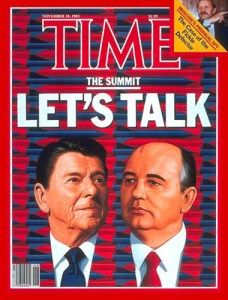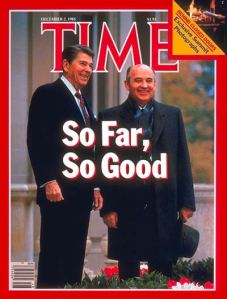Last week in his State of the Union address, President Obama said, “If John F. Kennedy and Ronald Reagan could negotiate with the Soviet Union, then surely a strong and confident America can negotiate with less powerful adversaries today.”
Videos by Rare
Indeed. Certainly no self-respecting conservative would’ve blasted Reagan for choosing diplomacy with Russia?
Actually, that’s exactly what they did.
Foreign Policy’s Peter Beinart has compiled a potpourri of anti-Reagan rightwingers:
In 1986, when Reagan would not cancel his second summit with Gorbachev over Moscow’s imprisonment of an American journalist, (Norman) Podhoretz accused him of having ‘shamed himself and the country’ in his ‘craven eagerness’ to give away the nuclear store… When Reagan signed the INF Treaty, most Republicans vying to succeed him came out in opposition. Grassroots conservative leaders established the Anti-Appeasement Alliance to oppose ratification and ran newspaper advertisements comparing Gorbachev to Hitler and Reagan to Neville Chamberlain.”
As late as December 1987, Charles Krauthammer was writing that “the fundamental misconception about Gorbachev is that he has somehow broken the ideological mold.” Until virtually the day the Soviet empire collapsed, Rep. Dick Cheney was calling glasnost a fraud. In 1988 George Will accused Reagan of having “accelerated the moral disarmament of the West … by elevating wishful thinking [about Gorbachev] to the status of public policy.”
Here’s what Reagan said about conservatives pushing for war in Nicaragua, which might’ve included bombing Cuba:
the suggestion ‘scared the shit out of Ronald Reagan,’ according to White House aide Michael Deaver… Reagan never seriously considered sending U.S. troops south of the border, despite demands from conservative intellectuals like Norman Podhoretz and William F. Buckley. “Those sons of bitches won’t be happy until we have 25,000 troops in Managua,” Reagan told chief of staff Kenneth Duberstein near the end of his presidency, “and I’m not going to do it.”
Newt Gingrich called Reagan’s 1985 meeting with Gorbachev, “the most dangerous summit for the West since Adolf Hitler met with Neville Chamberlain in 1938 in Munich.”
Republicans today who fancy themselves as Reaganesque in their aggressive foreign policy positions—like John McCain and Lindsey Graham and Marco Rubio and Peter King—don’t know what they’re talking about.
As with Iran today, when hawks reflexively eager for military action are confronted with cold logic that advises the opposite, they almost always fall back on the premise that intervention is somehow what “Reagan would do.”
Obviously, no one can know for certain what Reagan would do in today’s political climate. Eras and circumstances differ. But if neoconservatives and other hawks can claim that Reagan would want war with Iran, or Syria, or Libya then others can at least speculate what Reagan would do based on his actual record.
If Reagan were president and chose diplomacy with Iran, he would probably be getting an earful from these same Republicans.
Reagan’s foreign policy legacy is one of relative restraint. Wars, of the protracted type George W. Bush and Barack Obama have fought in Iraq and Afghanistan, are exactly what Reagan did not do, and even his few military actions were brief in mission and scope.
When Senator McCain was upset with tea party Republicans who opposed US intervention in Libya in 2011, he said, “I wonder what Ronald Reagan would be saying today.”
Columnist George Will answered McCain’s question: “Wondering is speculation; we know this: When a terrorist attack that killed 241 Marines and other troops taught Reagan the folly of deploying them at Beirut airport with a vague mission and dangerous rules of engagement, he was strong enough to reverse this intervention in a civil war.”
When that military intervention didn’t make sense, Reagan chose to ‘cut and run.’
Of course George Will was also one of Reagan’s foreign policy critics in the 1980’s, but today is outspoken about futility of our war in Afghanistan.
Will says that while he is concerned about a potentially nuclear Iran, war with that country would be far worse. Reagan’s primary fear was nuclear war, and later in his life, William F. Buckley expressed that part of Reagan’s greatness was the fact that he would’ve never pushed the button, even in retaliation.
Buckley, too, was a critic of Reagan’s foreign policy at the time. He changed his mind.
Hawks today, eager to shoot first and ask questions later, ignore the foreign policy lessons of the last decade as well as Reagan’s most lauded achievement.
Reagan’s greatest accomplishment is that he won the Cold War by not going to war.
Republicans should stop wondering what Reagan would do and start learning from what he did.




